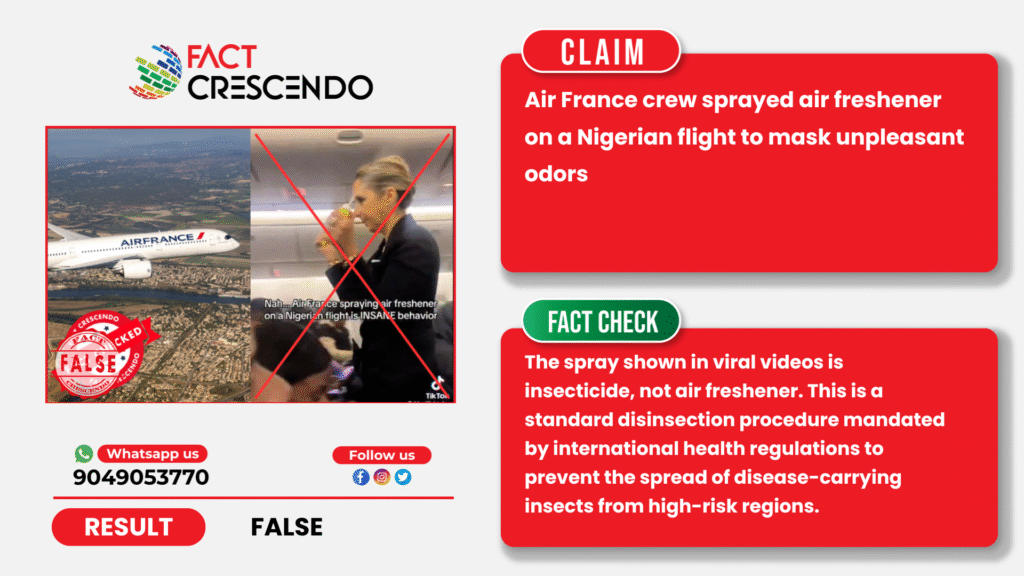
A viral video circulated online claiming that Air France crew sprayed “air freshener” inside the cabin of a flight to Nigeria, supposedly to mask unpleasant odors. Some posts went further, alleging that the incident caused passenger distress and even vomiting. However, a closer look reveals that this claim is misleading.
Social Media Posts
A viral video circulated on various online platforms showing flight attendants spraying the cabin, with claims that “Air France crew were spraying air freshener on a Nigerian flight.”
Fact Check
Upon investigation, we found that the spray in the viral footage is not air freshener but insecticide, applied in accordance with international health regulations.
Disinsection is a long-established requirement for flights to and from high-risk regions, including West Africa. The U.S. Department of Transportation confirms that such spraying is permitted, and in many cases mandatory, for airlines operating routes to destinations like Nigeria. Nigerian aviation reporting likewise shows that cabin spraying has been practiced for more than a decade, making it neither unusual nor unique to Air France. (Source)
Air France Policy and International Standards
Although Air France has not commented on the specific incident shown in the video, the airline’s disinsection procedures comply with international protocols established by global health authorities.
The airline implements insecticide spraying before flights to certain destinations, including Nigeria, as part of measures endorsed by the World Health Organization (WHO) and the International Civil Aviation Organization (ICAO). According to U.S. DOT guidance, France is listed among countries required to conduct spraying on inbound flights from malaria- or yellow-fever-endemic regions. ICAO Annex 9 further stipulates that only WHO-approved disinsection methods can be authorized, ensuring the safety of passengers and crew. Industry analysis also notes that France is one of several countries where carriers must routinely perform disinsection, underscoring that Air France’s practice is in line with global standards rather than an isolated decision.
Why Disinsection is Required
Disinsection is recognized by both WHO and ICAO as essential to prevent insects from carrying diseases across borders. This requirement is particularly relevant in Nigeria, which health authorities identify as a high-risk zone for mosquito-borne illnesses.
The CDC notes that malaria is endemic throughout Nigeria and advises all travelers to take antimalarial prophylaxis. Yellow fever vaccination is mandatory for travelers over the age of nine months, reflecting the country’s elevated transmission risk. The UK Government also reports frequent outbreaks of malaria and yellow fever, alongside periodic resurgences of other diseases such as cholera and Lassa fever. These persistent health threats explain why international regulations require insecticide spraying on flights to and from Nigeria. Far from being optional, disinsection is a protective measure to safeguard public health and prevent disease vectors from spreading internationally.
Public Reactions and Misconceptions
Passengers occasionally express discomfort with cabin spraying, often misinterpreting it as deodorizing or “air freshening.” In reality, official documentation from airlines and governments clearly identifies the sprays as insecticides used for health protection.
While some find the smell or sensation unpleasant, peer-reviewed studies report no consistent evidence of serious health risks when WHO-approved methods are followed. Most accounts characterize the procedure as irritating but not harmful, underscoring that its purpose is disease prevention, not odor control.
Conclusion
The claim that Air France sprayed “air freshener” on a Nigerian flight is false. What passengers witnessed was a standard disinsection procedure mandated by international health regulations to prevent the spread of disease-carrying insects. This practice is neither discriminatory nor unusual, but rather a necessary public health measure implemented on flights to numerous countries with high risk of mosquito-borne diseases.

Title:No, Air France Did Not Spray “Air Freshener” on a Nigerian Flight
Fact Check By: Cielito WangResult: False


